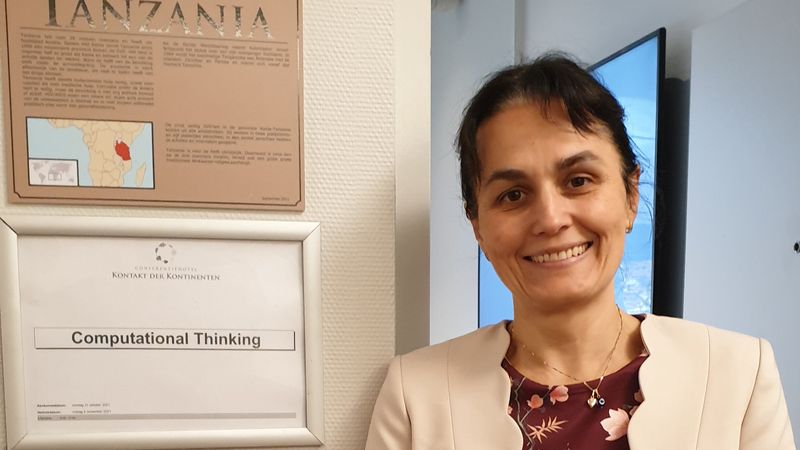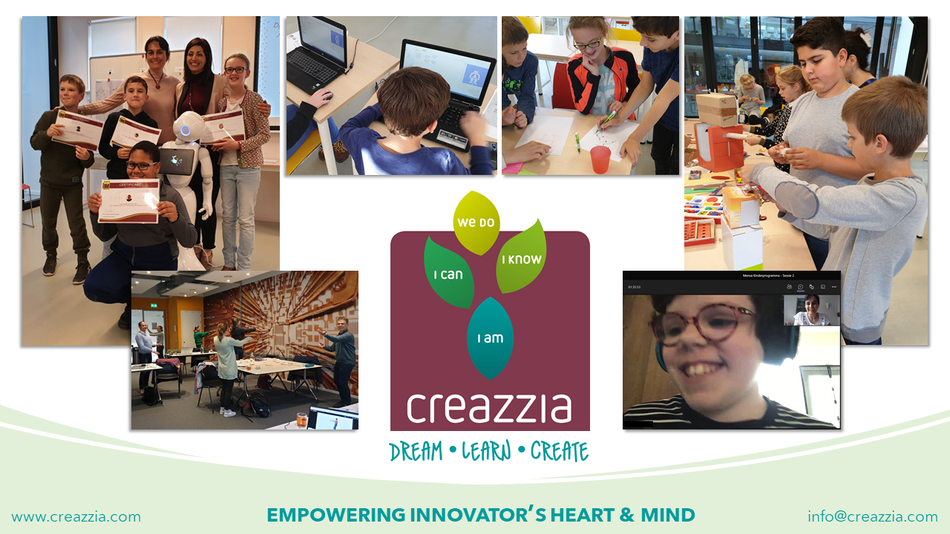Fe+male Tech Heroes role models 25 - Marina Velikova: "We need to empower children to become innovators in heart and mind"
Born and raised in Bulgaria, Marina Velikova was mesmerized when the first computer arrived in her hometown. She can still remember the pain of not being one of the students chosen to work with the machines. That was the moment she understood technology was her realm.

Born and raised in Bulgaria, Marina Velikova was mesmerized when the first computer arrived in her hometown. She can still remember the pain of not being one of the students chosen to work with the machines. That was the moment she understood technology was her realm. As a computer scientist, she collaborated with leading research organizations and high-tech companies on diverse technology-driven projects. Now, Marina is an entrepreneur aiming to empower youth to become innovators for a better world. With her company Creazzia, she's on a quest to help develop a more personalized educational approach integrating technology and social-emotional learning.
How did you end up in the Netherlands?
I started Informatics at Sofia University in 1999, specializing in Artificial Intelligence. As the field was not yet popular, I had to design my own academic program as I was the only student interested in the topic, which was fascinating for me.
During my course, I got an invitation to join a Ph.D. program in the Netherlands. So while I did my masters and worked, I also got to learn English, beyond the one I used to program, pretty quickly to pass the admission exams. I did so, and in 2002, I started my Ph.D. in Data Mining at Tilburg University.
Can you give us some examples of your projects?
I worked on research prototypes of decision-support systems with my colleagues from Radboud University and Radboud University Hospital. One of them was to help radiologists analyze mammograms more effectively to spot suspicious areas; the other was a smartphone application for pregnant women to monitor themselves at home to predict any complications before they could become severe.
I employed a similar applied research approach as a scientist at TNO for industrial projects with leading companies such as ASML, Philips, and Thales that build complex high-tech machines requiring automated diagnostics assistance. I explicitly refuse to work with defense and the military because that goes against my values. Except for that, I'm a really open-minded person, and I love learning new things and utilizing technology for problem-solving.
Education also has a special place in your heart...
That's my other passion. During my time in academia, I gave courses on computing and worked closely with students, which was fascinating and helped me grow as an educator. The truth is: technology is coming faster than we're teaching our children about it. At the same time, we don't get a deeper understanding of who we are - our talents, values, what we stand for. In education, things need to change to move from a knowledge-based mindset to a holistic, person-oriented, and empowering focus. Technology is a key enabler to making this shift by offering choices and support in learning contexts.
Where did the idea for Creazzia come from?
It's OK that technology is nowadays widely offered to children. I'm missing the thinking process before they start dealing with it. In other words, making explicit why building something and utilizing a structured approach to first create concept solutions on paper. We skip that part and jump into teaching them programming. To help the youth thrive in our technology-driven world, we need to empower them to become innovators – both in heart and mind.
Before Corona, I started offline workshops on Computational Thinking. I saw that children from the age of ten could follow and use the constructs when presented with concrete daily examples and project work. For example, decomposition – a core aspect of Computational Thinking - is applied when we design an app and break it down into different screens and components on each screen. The same mindset goes into planning our vacation in several steps and things to arrange, for example. I continue providing workshops for students and teachers. However, the Corona restrictions and my strive to enable ongoing personalized education for the next generation of innovators led me to set up the Creazzia platform.
How does the Creazzia platform work?
It aims to provide young learners with resources and a playground to create solutions with technology while driven by their interests and in their own way. Design, Computational Thinking, and the social-emotional skills needed to become an innovator with technology stand out on the platform. Users should first think about what they want to build, why, and for whom, then draw ideas on paper, and only then start programming.
I did pilots with several children, which I supported online during their learning journey. I noticed that it could be tricky for them to figure out what they want to do with technology. So, as a next step, I started providing them with context based on learning stories of topics close to their world to inspire them with ideas for tech solutions. For example, search for a chocolate product and build an app or a web page to inform others about the impact of chocolate on their health. The learners can also join the online community and participate in the online forum to connect and support each other.
What do you like the most about your work?
I love impacting people through interactive education – on computing or personal growth. Also, I have been happy to support the Ph.D. community at Tilburg University and initiate the Ph.D. community at TNO. I get energized by working with people of diverse strengths towards a common goal, seasoned with a pinch of joy. I come up with many ideas, but the best things happen when working with a committed team because you can complement each other.
As a start-up, finding the right people to cooperate with is a challenge. For now, I'm working with freelancers and contacts, but I would love to build up a longer partnership with dedicated people. I'd love to reach out to the Fe+male Tech Heroes community with an invitation for anyone interested in joining me on this quest. I'm looking for people or organizations with a vision, mission, or idea to make positive changes in education through technology and personal growth. They are welcome to visit our website https://creazzia.com/ or reach out via info@creazzia.com.
What's your view on diversity?
Moving to the Netherlands, I got my biggest life 'lesson' – different does not mean wrong. I understood that the norms I had been taught in Bulgaria were not all valid in this new context. By appreciating differences, we grow open-minded to see other people's truths and enjoy life way more. In the process, I discovered that changing context is fundamental to building such a perspective.
Diversity also helps you understand who you are. In any system or community you enter, you must know who you are, get to know others, and then see whether you can achieve harmony in that environment. Sometimes you'll only find conflict, and we have to acknowledge that. However, to know who you are, friction can help you reach more profound parts of yourself where you'll find certain beliefs that model your attitudes on the surface. So I suggest evoking every conflict to learn about yourself and the person on the other side because that conflict might be the way to find harmony later on. Conflict is about differences, and that's what I aim to bring with my work: help people understand who they are to better cooperate and get along with others.
Who have been your biggest influences or supporters throughout your journey?
Definitely my mother. She was a high school math teacher, and I had the privilege of being her student. She used her practice to transform students' lives by showing them that they were valuable and could grow with support and respect. Her life was, for me, an inspiring masterclass in gratitude and turning adversities into opportunities to thrive. I aim to amplify her legacy with my mission in education.
I also admire names like Steve Jobs, who take risks and persist in creating something unique and valuable, as much as I'm inspired by people like the Dalai Lama and Nelson Mandela, who stand for humanity and peace.
What has been the best piece of advice you were ever given?
During my bachelor's degree, my supervisor gave me a piece of advice from ancient times: "know one's measure and live accordingly." In other words, avoid the extremes and, instead, pursue balance. That is your own balance, of course - it's not universal. If you look at conflicts and problems, you see that they are usually the result of extremes. That idea stayed with me, and balance is something I'm constantly seeking in life.
There is also something special I'd like to share. In memory of my mother, who passed away, I wrote her a letter of gratitude and shared it on LinkedIn, including her great pieces of advice to her students: "despite the difficulties, you must keep your dignity, optimism, and faith." And I add to that: No matter how big or small what you do is, no matter where you come from, no matter what you look like – you are given the precious gift of life, so, unpack it, be thankful for all you have, and live with joy and dedication to your passion and your true self.
